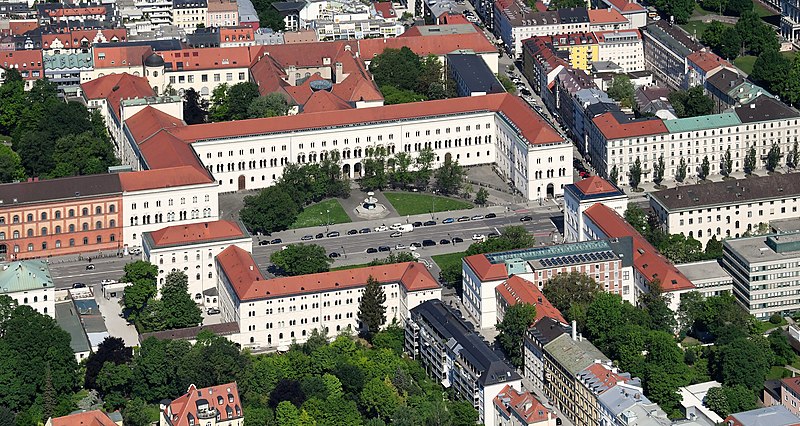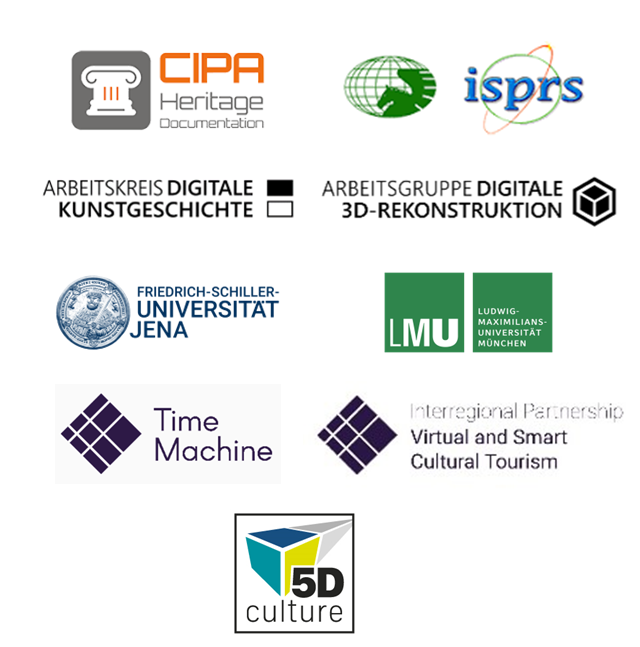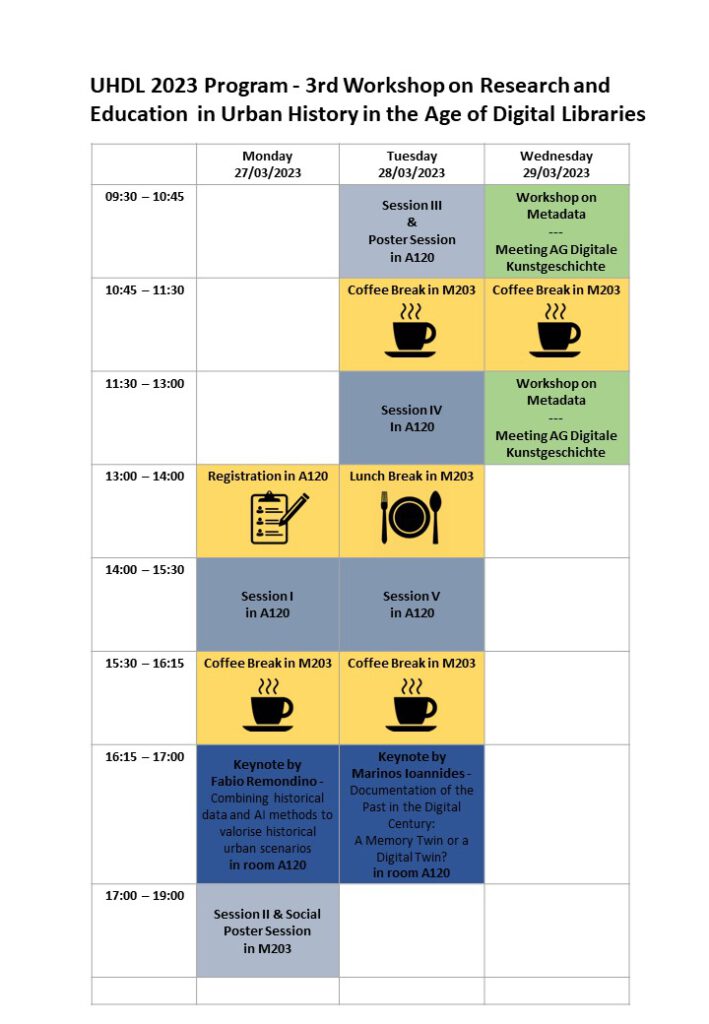Workshop on Research and Education in Urban History in the Age of Digital Libraries
Munich, 27 & 28 March 2023
Call for Contributions
Urban and architectural history are key areas in digital humanities and digital heritage. With respect to these research areas, digital repositories, data and research methods play an important role, especially when hosting visual media like photographs, paintings, or drawings, and last but not least physical and virtual models. Due to the wide field of possible research, different approaches, methods and technologies have emerged – and are still emerging.
The purpose of the workshop is to provide a full picture with regards to epistemics, technology and framework conditions. We aim to discuss crucial challenges for further research and encourage exchange and debate. We would like to invite contributions on theoretical and methodological issues, application scenarios and projects, as well as novel approaches and tools. This includes the following five areas:
- Theory, Methods, and Systematization
- Data handling and data schemes
- Machine Learning and Artificial Intelligence
- Visualization and Presentation
- Education in urban history
To this cause, we are seeking original and innovative contributions in theoretical and practical applications on Digital Cultural Heritage.
TOPICS
Theory, Methods, and Systematization
Digital humanities research as an inherently interdisciplinary field has created a high demand for critically reflected methods, techniques, valid strategies, classifications, and quality standards. But do computing methods also lead to new and ground-breaking research questions, approaches, or insights into architectural and urban cultural heritage research? In most cases, the use of computing simply extends nondigital possibilities, without much change to the pre-digital approaches and research questions. Nevertheless, digitalization has dramatically altered research qualities, quantities, and workflows. We welcome contributions on:
- relevant data for architectural and urban history in digital archives and image repositories
- the effects of the use of digital archives and image repositories on scholarly work
- concepts and projects for networking and cooperation
- possible research questions regarding objects, spaces, content or historical events
Data handling and data schemes
The immense effort invested in digitization and rapid changes in technologies and formats has greatly increased the importance of data standards. Long-term data storage, availability of models and the interoperability of data formats are major challenges to existing digital infrastructures. We welcome contributions on:
- 3D databases as a tool to support urban historical research
- Metadata and paradata
- Remote sensing approaches to support contextualization and intuitive access to data
- Linked and semantic data related to urban historical research
- the influence of knowledge of HCI on the design of historic models
Machine Learning and Artificial Intelligence
During the past few years, various new technological opportunities have arisen from big data, Semantic Web technologies, and the exponential growth in data accessible via digital libraries such as EUROPEANA. Data-driven supervised and unsupervised classification approaches have been used to acquire high-level semantic concepts, especially from the interconnection of different types of data. Interdisciplinary collaborations between computer science and humanities disciplines are essential in developing methods and workflows to enable cultural heritage research to exploit machine learning approaches. We welcome contributions on:
- use cases and best practices of applied machine learning in digital humanities research
- novel approaches e.g., (semi-) automatic photogrammetric reconstruction of historical buildings from image databases
Visualization and Presentation
Historians in cultural heritage research today are enabled to explore new research directions due to the availability of multitudes of digitized historical photographs in image repositories. Moreover, novel approaches such as the photogrammetric reconstruction of historical buildings from image databases allow for contextualization and intuitive access to data. Typical motivations for accessing these archives and repositories are scientific research, pedagogical applications, and the study of historical sites. These areas require advances in methods for visualization and presentation of data to support the different target groups. We welcome contributions on:
- Projects and investigations from urban history concerned with visualizations and presentation of spatial and/or scholarly data
- Research scenarios for scholars using visualizations of urban history data
- Interdisciplinarity, e.g. intersections between digital cultural heritage and (sustainable) tourism studies
Education in urban history
Education and support by digital libraries still only plays a minor role in scholarly discourses on cultural heritage and in particular urban history. There is still no broad consensus on specific education paradigms or a canon of didactic settings in digitally supported teaching on urban history, and as yet no larger studies have been conducted in this area. We welcome contributions on:
- educational scenarios for teaching urban history supported by digital methods
- approaches to employing large scale repositories for educational purposes in cultural history
- the design of virtual experiences as e.g. city tours
Paper Submission
Please submit an extended abstract of 1000-2000 words (~ 2-4 pages) in PDF format by December 15th, 2022 via the electronic upload submission procedure on EasyChair.
All submissions will be peer reviewed for their originality, validity, methodology, writing quality and overall contribution to the research fields of the conference. The conference adopts a double blind reviewing process. The authors must ensure that any information such as affiliations, contact details, e-mails or other type of information that can help identify the authors of the papers are removed from the submitted version.
Please use the Springer LaTeX2e, Microsoft Word 2003 or Microsoft Word 2007 templates and guidelines for formatting your extended abstract.
Selected submissions are proposed to be published in the Springer CCIS series – previous issues can be found here.
Timeline
| 15 December 2022 | Extended Abstract Submission (~2-4 pages) |
| 3 February 2023 | Notification |
| 17 February 2023 | Start of Registration for Workshop |
| 26 March 2023 | Full Paper Submission (for selected papers only) |
| 27 & 28 March 2023 | Workshop in Munich |
Venue
The workshop will be hosted by the LMU Munich.
Address: LMU main building, Geschwister-Scholl-Platz 1, 80539 Munich, Germany
The sessions will be in room A120 also called kleine Aula on the first floor. There will be refreshments and snacks in room M203 on the second floor during breaks.

Accommodation
We have prepared a short list of hotels for you which are close to the venue. We can recommend Familienbäckerei Kistenpfennig (Amalienstraße 28) a bakery and cafe close by that serves good and affordable breakfast.
| Carlton Astoria Fürstenstrasse 12, Maxvorstadt, 80333 München Hotel Homepage | Single Room one night for 100 EUR Breakfast for 10 EUR |
| Leonardo Boutique Hotel Amalienstrasse 25, Maxvorstadt, 80333 München Hotel Homepage | Single Room one night for 89 EUR |
| Hotel Antares Amalienstrasse 20, Maxvorstadt, 80333 München Hotel Homepage | Single Room one night including breakfast for 80 EUR |
| Yours Truly Schützenstraße 1, Ludwigsvorstadt, 80335 München Hotel Homepage | Single Room one night for 121 EUR Breakfast for 15,40 EUR |
| Smart Stay Hotel Station Schützenstraße 7, Ludwigsvorstadt, 80335 München Hotel Homepage | Single Room one night for 98 EUR Breakfast for 6,90 EUR |
| Hotel Hauser an der Universität Schellingstr. 11, Maxvorstadt, 80799 München Hotel Homepage | Single Room one night including breakfast for 95 EUR |
Registration & Program
The workshop will be held in English and registration for the event is free of charge. Nevertheless, we ask you to register for the event so that we have a reliable number of participants for the planning.
The Program for the UHDL 2023 is now available. Download and check the PDF for more information on sessions and presentations. There are 15 min and 5 min slots for presentations not including discussions. Please adhere to the time constraints.
Anyone interested can join the sessions virtually:
Zoom-Link: https://uni-wuerzburg.zoom.us/j/65962706930?pwd=bFpobmhxT1BOY1EzbjQyMURTS21kQT09
Meeting-ID: 659 6270 6930
Kenncode: 284533
We encourage all participants to bring a small poster (e.g., A3, 297 × 420 mm) of either their presentation or another interesting project. A picture and a statement are enough to get a conversation started or draw attention to the compelling work being done. We want the workshop to provide an opportunity for exchanging ideas and getting inspired.
Commitee
Organizing Committee
| Prof. Sander Münster | DE | J.Prof. Digital Humanities, FSU Jena |
| Dr. Aaron Pattee | DE | Institut für Kunstgeschichte, LMU Munich |
| Cindy Kröber | DE | Digital Humanities, FSU Jena |
| Dr. Florian Niebling | DE | Digital Media, Fulda University of Applied Sciences |
Programm Committee
| Prof. Fabrizio Apollonio | IT | Università di Bologna – Alma mater studiorum |
| Clemens Beck | DE | Digital Humanities, FSU Jena |
| Jonas Bruschke | DE | Julius-Maximilians-Universität Würzburg |
| Dr. Valerie Gouet-Brunet | FR | LASTIG Lab. / Univ. Gustave Eiffel / IGN |
| Prof. Ning Gu | AU | University of South Australia |
| Prof. Stephan Hoppe | DE | Institut für Kunstgeschichte, LMU Munich |
| Prof. Marinos Ioannides | CY | Digital Heritage Research Laboratory, Cyprus University of Technology |
| Prof. Thomas Köhler | DE | Vocational Education, TU Dresden |
| Prof. Piotr Kuroczyński | DE | Hochschule Mainz – University of Applied Sciences |
| Dr. Ferdinand Maiwald | DE | Digital Humanities, FSU Jena / Photogrammetry, TU Dresden |
| Dr. Heike Messemer | DE | CODIP, TU Dresden |
| Gustavo Nogueira | DE | Digital Humanities, FSU Jena / Temporality Lab Amsterdam |
| Prof. Ramon Reyes Rodriguez | MX | Universidad de Guadalajara |
| Dr. Heather Richards-Rissetto | USA | University of Nebraska-Lincoln |
| Prof. Fulvio Rinaudo | IT | Politecnico di Torino |
| Prof. Stratos Stylianidis | GR | Aristotle University of Thessaloniki |
| Dr. Ying Sun | DE | Digital Humanities, FSU Jena / Mediadesign Hochschule Berlin |
| Prof. Rosa Tamborino | IT | Politecnico di Torino |
| Prof. Alex Yen | ROC | China University of Technology, Taipeh |
| Prof. Sina Zarrieß | DE | University of Bielefeld |
Proceedings

Previous Proceedings
Contributions from previous workshops in 2017 and 2019 have been published as Springer CCIS: https://link.springer.com/conference/uhdl

5th Conference DECH 2017 and the 1st Workshop UHDL 2017, Dresden, Germany, March 30-31, 2017, Revised Selected Papers

2nd International Workshop UHDL 2019, Dresden, Germany, October 10–11, 2019, Revised Selected Papers
Contact
Prof. Dr. Sander Münster
J. Professor for Digital Humanities (Images/Objects)
Friedrich-Schiller-Universität Jena
Leutragraben 1
D-07743 Jena (Germany)
For any questions about paper submissions and the workshop itself you may contact the organizers by email to uhdl2023@visualhumanities.org
In cooperation with


